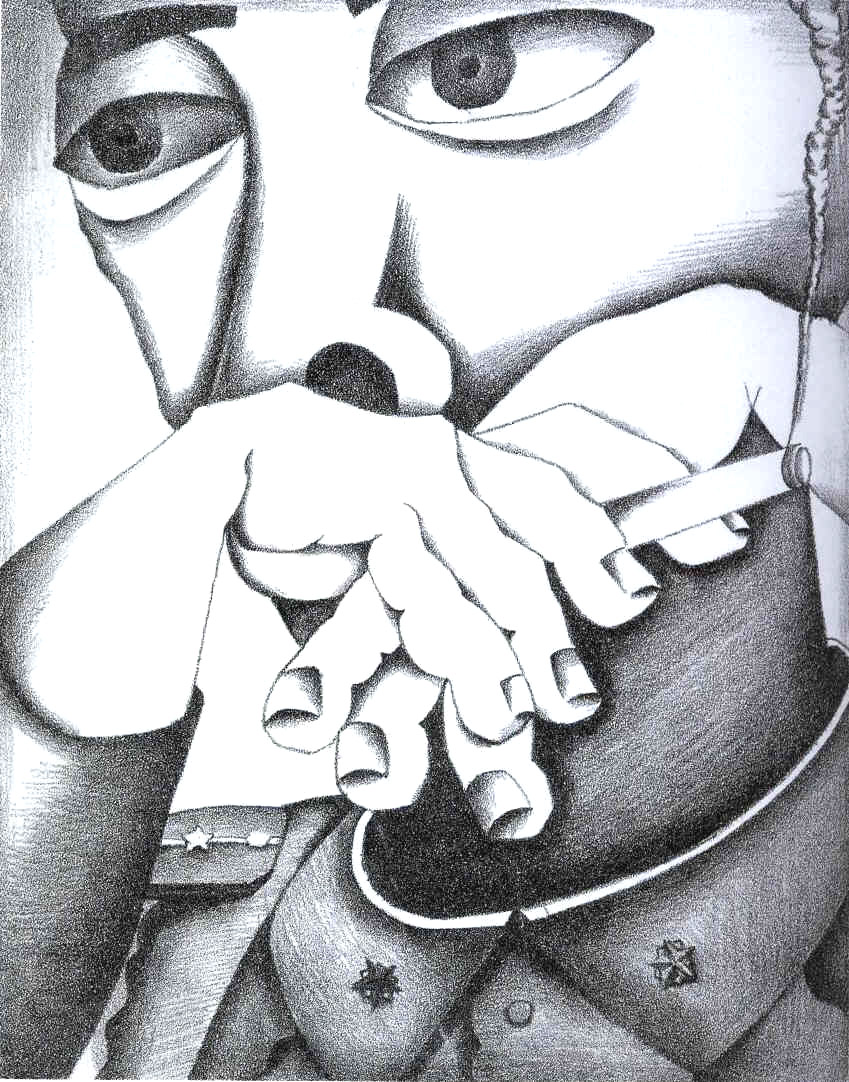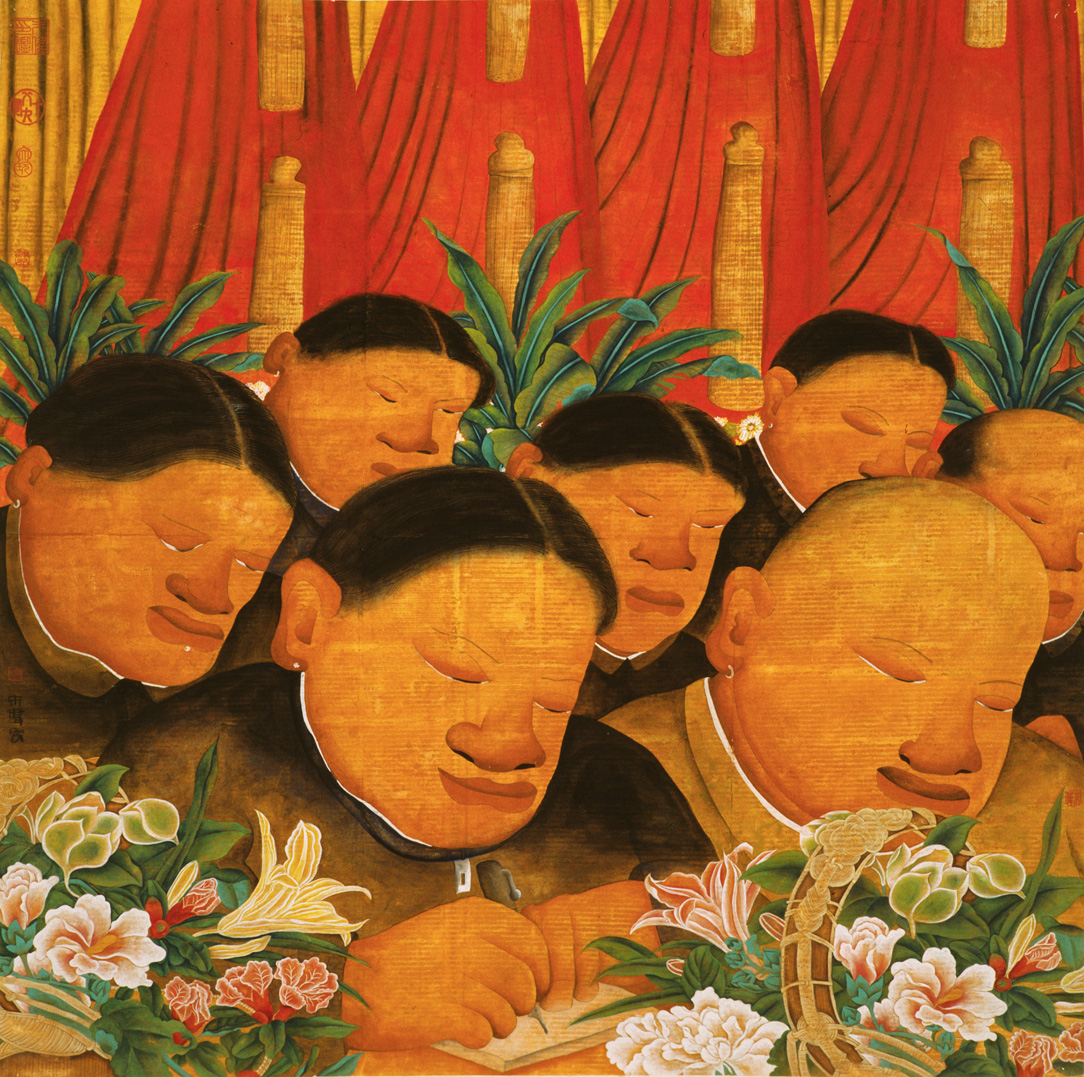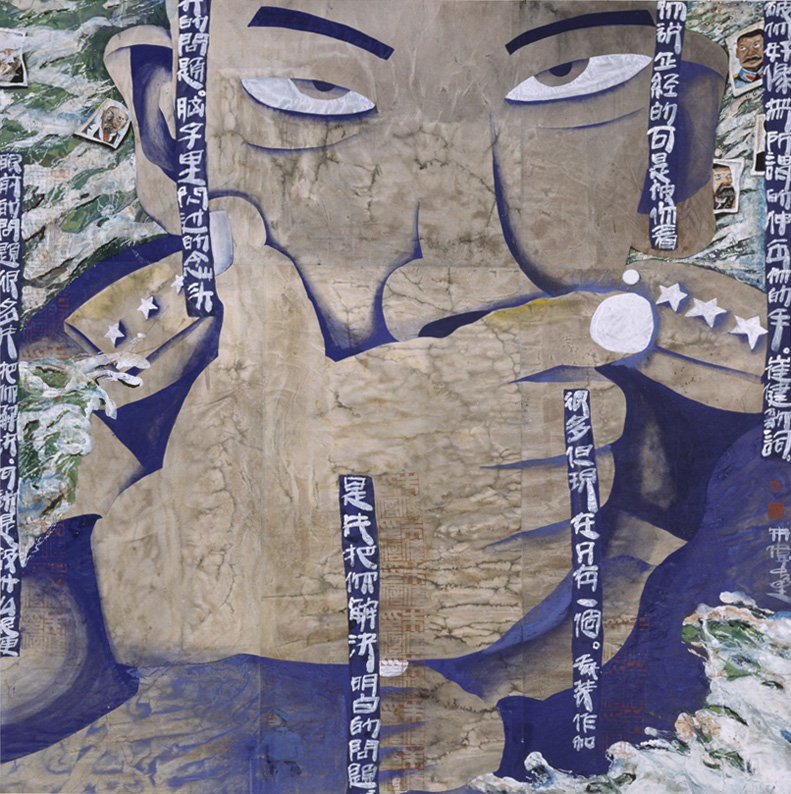
|
|
ZHU
WEI
Li Xiaoshan
Without doubt, Zhu Wei and his work have become a mirror of contemporary
Chinese art. Zhu Wei has penetrated the depths of reality with his
extraordinary wit and sharpness, and opened a new door for the public to
acquaint themselves with Chinese contemporary art through his works,
which are lively and rich in visual tension. I have written an article
which focuses on the following observation: the reason why Zhu Wei
reigns supreme in the Chinese contemporary art scene is that, unlike
other short-sighted artists who sacrifice their artistic ideal as a
result of temptations of all sorts, Zhu Wei kept raising his artistic
platform until it reached a height which is unsurpassed by others.
Amazingly, he might be subtle and introverted in temperament, yet in art
he is like a fighter charging ahead, seizing a foothold in the various
fields of ink painting, printmaking and sculpture. Some of his works are
already classics of our time, assuming an unchallengeable historical
position. If my prediction is right, these works shall become monuments
of artistic creation.
As an artist, a contemporary Chinese artist in particular, many
complicated factors have been transformed outwardly into the set design
behind the work. People seem to enjoy and be enamoured of the ornaments
in the set. To quote Li Xianting: “What is important is not the art”
- but what is? Many years ago I was involved in a discussion
with several art critics about some strange phenomena in Chinese
contemporary art. We all came to the conclusion that, because of outside
disturbances and inborn anaemia, our artists generally suffer from
malnutrition; not because they lack talent or have devoted too little
effort; it would certainly be unfair to ask that they strive to make up
their inborn limitations. If at all there is a problem with the
artists, it’s because the soil which nurtures them is barren. The
limitations are pre-set and it’s not difficult to trace the root-cause
of all kinds of narrations. Still, there is an exception to everything
and a few members of the cream of China’s contemporary art scene seem
to possess a kind of self-sufficiency. This element of self-sufficiency
is rooted in their genius and vision, which transports them beyond
pre-set limitations.
|
|

|
One day, some years ago, I had a chat with Zhu Wei about the relation
between the fame of an artist and artistic creation, and I discovered,
to my surprise, how low-keyed he is. Then I remembered someone once told
me Zhu Wei is an interesting subject - one can always uncover something
out of the ordinary from him. I have received material on him, from the
artist himself, in which there is no lack of records of excellence. Yet
I could see his effort in trying to conceal those records. Westerners
like to say that your character is your fate. Many people do not know
how to treat their fate; |
| Zhu
Wei never flaunts his achievement or outlines a grand panorama of his
vision for the future. To quote him, he just “labours silently like a
hard-working farmer.”
In the grip of summer heat Zhu Wei arrived in Nanjing on a tour. During
our conversation we hit on the idea to record the content of our casual
chat and should something worthwhile emerge, to compile it into a
collection of dialogue on art and life. The dialogue went on for nine
days and basically our thoughts and positions conveyed in the process
were well captured with the recording. We titled the recording Talk of
Nine Days to give it a time dimension. It was perhaps the first time Zhu
Wei had delved deep into things he seldom touches on in ordinary life,
and I discovered a passion in him for the expression of feelings hidden
underneath his linguistic simplicity and self-repression. Despite his
low-keyed style and unwillingness to get into verbal flourish, I believe
I captured his linguistic buoy. His talent and perseverance are
illustrated not only in his paintings - he has an immense inner strength
which is amazing.
In his discussion of the artistic traits of artists, Taine emphasised:
“There is a ‘family’ behind all the artists.” To me it means no
artist can avoid a certain inherent restraint on him/her. I discovered
an interesting fact in my reading of some of the critiques of Zhu Wei by
critics outside China: these critics (including art curators) inevitably
hold a common stand in their interpretation of contemporary Chinese art
- they try their very best to crack the ‘secret political code’
hidden in the work of Chinese artists; with thoughts turned to a
political linkage even in seemingly ordinary scenes or depictions. I
think the political interest in the Chinese artists has obviously been
exaggerated - even demonised - by some Westerners. Yet, from an
ideological and psychological perspective, this phenomenon is enhanced
by a relationship of mutual dependence. Zhu Wei’s art is the product
of this age and, to quote Taine again, a member of the “family”. The
question is: can we find artistic expressions that are deeper in nature,
given the fact that all are typical works of the same age? What’s
contained in some representative works of Zhu Wei is neither a statement
nor cynicism or play; its implications are different from ‘political
pop’. Here I would like to add that there is often a basis to
the political complex of the Chinese artists, whose thread is clearly
discernable. Prompted by a desire to give vent to personal feelings,
artists are unanimously attracted to common subjects and themes; the
effect of the ‘family’ is evident. In handling his subjects, Zhu Wei
skilfully turns a certain collective unconsciousness into a unique
personal viewpoint. In his work he ingeniously interweaves his childhood
dreams with real-life circumstances, constructing a virtual reality that
runs parallel to life; a reality that is filled with all sorts of
contradictory contrasts which dissolve unenthusiastically into harmony,
and which mirrors a pain in the depths of his spirit. At the same time,
the pain reflects his genuine concern for society and humanity.
|
|
Zhu Wei has repeatedly emphasised to me the essence of “humanity”
rather than the so-called “political complex”. As far as the issue
of humanity is concerned, specific concern can be demonstrated only
within the scope of a specific linguistic context, since there is no
pure, abstract humanity. However, his concern for humanity
makes Zhu Wei more mature than his contemporaries. Zhu Wei does not
explicitly reveal the ‘humanity’ aspect but keeps his feelings
condensed at the level of sensibilities which, for an artist, happens to
be a solid and effective gesture. I wish to elaborate that
‘humanity’ in the eyes of Zhu Wei is interpreted variedly from the
lengthy and laborious one offered by the intellectuals. He approaches it
from the soil of existence stripped of all frills. |

|
| Humanity
is pervasive while political complex changes with time. That Zhu
Wei is able to deepen his themes on the basis of humanity is a crafty
act. I have seen quite a large number of Zhu Wei’s works and
realised that the myriad themes are but contours of expressions for him;
what lies at the core of these works is his superb grasp of man’s
situation in life. Be it a work that impresses outwardly as
politically-inclined or one that reflects his personal experiences, the
common thread which runs through them is evident.
Ink painting is the main medium utilised by Zhu Wei, who has also
created a considerable number of sculptures and prints. Wherever one
might find his ink pieces, it is obvious, from motif to expressiveness,
the artist has exploited to the full the expressive powers of the
medium. One might say that in his hands ink painting is no longer an art
medium but a deft mother-tongue, a tool which he wields to perfection. I
have seen too many shoddy works and works which showcase petty acts;
there are indeed many painters around us who win fame and fortune by
gimmicky feats; such a trend tends to threaten, to erode, all the
artists inside the circle. Zhu Wei doesn’t mind if he is considered an
insider or not - he counters the erosion almost by a kind of self-exile.
His ink paintings are much sought after by a considerable number of
collectors, but I think few among them truly comprehend the meaning of
his works. I have written an article titled From Chinese Painting to Ink
in which I state the change in concept is actually a change in
standpoint. The endless debates on ‘Chinese Painting’ are due to the
ambiguity in concept, while ‘Ink’ is a medium. Hence it is highly
flexible, in terms of the scope and form of its expression. Zhu Wei
doesn’t care much for the kind of expressive (xie yi) ink paintings
which are casually composed, and rejects others which are shabbily
painted on the spur of the moment. An American researcher of Chinese art
history has asserted that the rise of the expressive (xie yi) painting
halted the development of Chinese art history. Putting aside the issue
of whether this is bigotry, his judgment was formed on account of the
phenomenon he observed. Chinese painters are fond of saying “One
should follow the spirit of the ancients and not their way.” This
rather reverses the correct order of things. From the works of many
contemporary artists one can see that much of the way of the ancients
has been used with the “spirit” thrown to the wind. Zhu Wei makes no
bones about his love of gongbi (fine-lined traditional style) painting.
In his work, the mode of gongbi as a form of expression serves to bring
out the idea and atmosphere of his imagery. His use of line, colour and
texture shows continuity of the traditional practice, but because his
conceptualisation originates from reality, a flavour of contemporary
time is palpable in his works. In the creation of imagery I would say he
has surpassed the ancients. And I must again emphasise the contemporary
flavour of his imagery - note that many contemporary artists love to
resort to the externalisation of self-image, but in Zhu’s work, its
handling has become a symbol of the times. Many years later, the images
in his painting shall be the visual code with which people can
distinguish our era.
At one time there were heated discussions among Chinese art critics
about the limitations of the expressive power of ink painting, which
obviously runs counter to the present situation of contemporary art.
Take Zhu Wei for example: whether ink painting, printmaking or
sculpting, genre and medium are of no significance - when the time is
ripe an artist will give life to whatever form of art when spurred by a
creative impulse. The prints of Zhu Wei take on the characteristics of
his ink painting: abbreviated, pure and simple, and full of visual
tension. Furthermore, the nature of the print material serves to enhance
the form quality of his imagery. Zhu Wei’s sculptures are
scattered in various regions outside of China, which makes it difficult
for the mainland viewers to view them. I have told Zhu Wei that
sculpture is quite an impressive component of his repertoire and that I
would like to invite him to participate in a forth-coming exhibition of
architecture and sculpture which I am planning. I think the fact that
Zhu’s works have captured the fancy of overseas organisations and
individual collectors also gives an international dimension to his art,
and adds a demonstrative value to it.
Dictated by his habits and predilections, Zhu Wei moves forward,
step-by-step, remaining as low-keyed and earthy as he has always been. I
have reasons to believe that he is growing and heading for his zenith,
and that of our times. Today, more and more people have a clear view of
his gigantic stature. This is the triumph of time - just like they
say: “Time is the final judge.”
25-12-2004
First published in Zhu Wei: New Pictures of the Strikingly Bizarre, p.8-17, published by Singapore Print Institute and Plum Blossoms (International) Ltd., 2005 |
|
|
|
|
|
|
Professor Li Xiaoshan is the director of Graduate School of Contemporary
Art of Nanjing University of the Arts, and director of Art Museum of Nanjing University of the Arts. |
|
朱
伟
李小山
毫无疑问,朱伟和他的作品已经成为中国当代艺术的一面镜子,原因在于:朱伟以他超凡出众的智慧和敏锐穿透了现实的重重幕帘,并以他充满生命气息和视觉张力的作品,向人们洞开了一扇认识中国当代艺术的大门。我曾写过一篇文章谈到这个现象:朱伟之所以能够在中国当代艺术领域里独领风骚,关键在于他没有像一些短视的艺术家那样,因为各种诱惑而降低其艺术理想,——相反,他坚持把艺术的底线一再往上提升,提升到一个别人难以跨越的高度,尽管他的个性是含蓄而内敛的,但在艺术上却像一个冲锋陷阵的斗士,在水墨画、版画、雕塑的创作上攻城掠地,他的某些代表作已是这个时代的经典,具有不可动摇的历史地位。
作为艺术家,尤其是作为当代中国的艺术家,许多复杂的因素均外化成为背后的布景,人们似乎更欣赏、更着迷于布景中的点缀,用栗宪庭的话说:重要的不是艺术。——不是艺术,是什么呢?许多年前,我和几个批评家讨论中国当代艺术中的一些奇怪现象,都认为,由于外部纷扰与内在贫血,艺术家普遍存在着营养不良,我们觉得,不是艺术家的努力不够或才华不足,要求艺术家将先天性的娘胎里带来缺陷依靠后面的勤劳来弥补,那是不现实的。假如说艺术家有问题,成因在于培育他们的土壤太板结,局限是预设的,所以种种言说都很容易找到根源。然而,凡事都有例外,中国当代艺术中的最优秀的一部分人,似乎天生具备某种自足性,这种自足性的本质是他们的才华和视野,促使他们超越了先验的局限。
|
|

|
几年前的某一天,我和朱伟谈及艺术家的名声和创作的关系,发现他如此低调。我想起了有人对我说的,朱伟是个非常有趣的个案,从他身上可以挖掘出另一种常态以外的东西。我收到过朱伟寄给我的资料,里面的有不少足以骄人记载,然而,我却看到他对那些记载的掩藏。西方人喜欢说性格即命运,其实很多人并不知道该如何对待命运,朱伟从来不炫耀他的业绩,从来不抒发他对未来图景的宏大构想,用他自己的话说,只像一个勤劳的农民,踏踏实实地埋头劳作。
|
|
丹纳论述艺术家的风格特征时这样强调:他们身后都有一个“家族”,换句话说,任何艺术家都避免不了某种必然性制约。我读到国外批评家对朱伟作品的评析,发现一有趣的现象,国外批评家(包括策展人)对中国当代艺术的解读,都有一个相同的立场:他们竭尽一切可能去破译中国艺术家作品中的“政治密码”,即使看似寻常的场景或故事,也不无牵强地联系到政治的根子上。我以为,中国艺术家对政治的兴趣明显被某些西方人士夸大了,甚至到了妖魔化的程度,而从意识形态和心理接受的层面上,双方之间的依赖关系又大大强化了这样的印象。朱伟的作品是这个时期的产物,用丹纳的比喻,是“家族”中的一员,问题在于,同样是某个时期艺术典型,有没有更深层面上的精彩表达呢?就如朱伟的一些代表作,其内容所涉及的东西即不是声讨,也不是调侃和嬉戏,它蕴涵的意义是与“政治波谱”或“泼皮”不一样的。我得补充,艺术家的政治情结并非空穴来风,它的线索很清晰,由于不吐不快的情感因素,艺术家不约而同对某类题材和内容感兴趣,“家族”的潜在作用显而易见。朱伟在处理他的题材时,非常老练地将一种集体无意识转化成他个人的独特视角,把童年梦想和现实境遇巧妙地穿插起来,构筑了一个与生活并行的虚拟实在,里面设计了各种自相矛盾的对立,对立之中又自行化解为无奈的和谐,折射了他精神暗处的隐痛,同时,这种隐痛折射了朱伟对社会和对人性的真切关怀
朱伟曾反复对我强调所谓“人性”的重要实质,而不是所谓的“政治情结”。关于“人性”问题,在特殊的语境中只能赋予特殊的关注,因为没有纯粹的抽象的“人性”,然而,关注“人性”的出发点,使朱伟比他的同代艺术家更为成熟。朱伟没有具体落脚到“人性”的范畴,只是凝滞在感受层面上,对艺术家而言,恰恰是一个很落实的很有效的动作。我想说明,朱伟眼里的“人性”和知识分子的烦琐解释不一样,他是站在生存的土壤上,以朴实无华的方式当做思考出发点的。人性是普遍的,“政治情结”却是随时间的推移而改变,朱伟以“人性”为基点深化他的主题,无疑是一种高明之举。我观赏过朱伟不少作品,发觉各种各样的题材对他来说仅仅是表达的轮廓,他对人的生活状态的把握才是他作品的内核。不管是他那些外表看来带有“政治”色彩的作品,还是那些个人经验化的作品,从根本上看,一条主线是贯穿始终的。
朱伟以他的水墨画作为主打,又创作了数量不低的雕塑和版画。朱伟的水墨画放在任何场合都可以一眼认出,说明一点,无论从图式到表现性,他都实际地发挥了水墨画表现力的边界效应,可以说,水墨画在他手里,已经不是一个画种,而是得心应手的母语,他将他的母语发挥到了极致。我看到了太多的粗制滥造,和太多的贩卖小聪明的伎俩,那种依靠一点才情博取名利的家伙遍地都是,败坏的风气很容易腐蚀所有在场者。朱伟不屑于“在场”,他几乎依赖于自己的自我放逐来抵御那种侵蚀。朱伟的水墨画已被很多人追捧,但是,我觉得他们之中有不少人尚未真正理解他作品中的涵义。我曾撰写过一篇《从中国画到水墨》的文章,谈到概念的转变其实是思考立场的转变,“中国画”所带来无休止争论在于概念的模糊性。水墨则是媒材,因此,就它的表现范围和表现形式而言,都显得更具弹性。朱伟不看重那种随意性很强的写意画,甚至对那种乱涂乱抹的写意画颇为排斥。美国一位研究中国美术史的学者断言:写意画的兴起终止了中国美术史的发展,姑且不论他是否偏执,毕竟他是依据现象判断的。中国画家经常喜欢说:师古人之心,不师古人之迹。这正好把顺序做了不合理的颠倒。从当代许多艺术家的实践看,“古人之迹”是被常常利用的,“古人之心”却抛到九霄云外。朱伟毫不隐晦自己对传统工笔表现方式的偏爱,不过,在他的作品里,方式完全从属于画面所体现的观念及气氛所需,例如他在技法上——诸如线条、色彩、机理等等,皆与传统方式的延续有关,但由于他的观念是从现实中生长,因此他作品中强烈的当代气息扑面而来。特别是在造型方面,朱伟具有超越古人的独特贡献。我仍得强调他在造型上生活气息,实际上,有很多当代艺术家喜欢利用自我形象的外化,但是在朱伟那里,形象的处理已成为一个时代符号,在若干年以后,他画中的那些形象将是人们认识我们时代的视觉代码。
有一度,国内的批评家热衷于讨论水墨画表现力的边界问题,显然,这是有悖于当代艺术现状的。正如朱伟在水墨画之外,又创作了为数不少的版画和雕塑那样,作品的类型和媒材无关紧要,艺术家在某种创作激情的推动下做出这种或那种作品,是水到渠成的。朱伟的版画承袭了他水墨画中的特征:简洁、单纯和富有视觉张力。另外,由于版画的材料性能,更加显示出造型上的形式感。朱伟的雕塑作品全都散布在国外的不同地区,所以国内的人很少能够欣赏得到。我对朱伟说过,雕塑是他整个创作的相当精彩的部分,我将在我不久后主持的一个建筑、雕塑活动里力邀他参加。我以为,某些国外的收藏机构和收藏家喜欢它们,显示了朱伟作品的国际化意义,也是一种示范的作用。
朱伟被他的生活惯性拉动着一步步迈进,依旧如往常一样低调和朴实,但是我有理由相信,他是与我们这个时代的艺术一起成长并一起登顶的,时至今日,越来越多的人终于
看清了他高大的身影,这是时间的胜利,——正如俗话所说的,时间是最终的裁判者。
(2004·12·25)
首次刊发于新加坡泰勒版画研究院及Plum Blossoms国际有限公司2005年出版画册《朱伟 新二刻拍案惊奇》,第8-17页
|
李小山 南京艺术学院教授,美术馆馆长,当代艺术研究所所长。 |
|
|